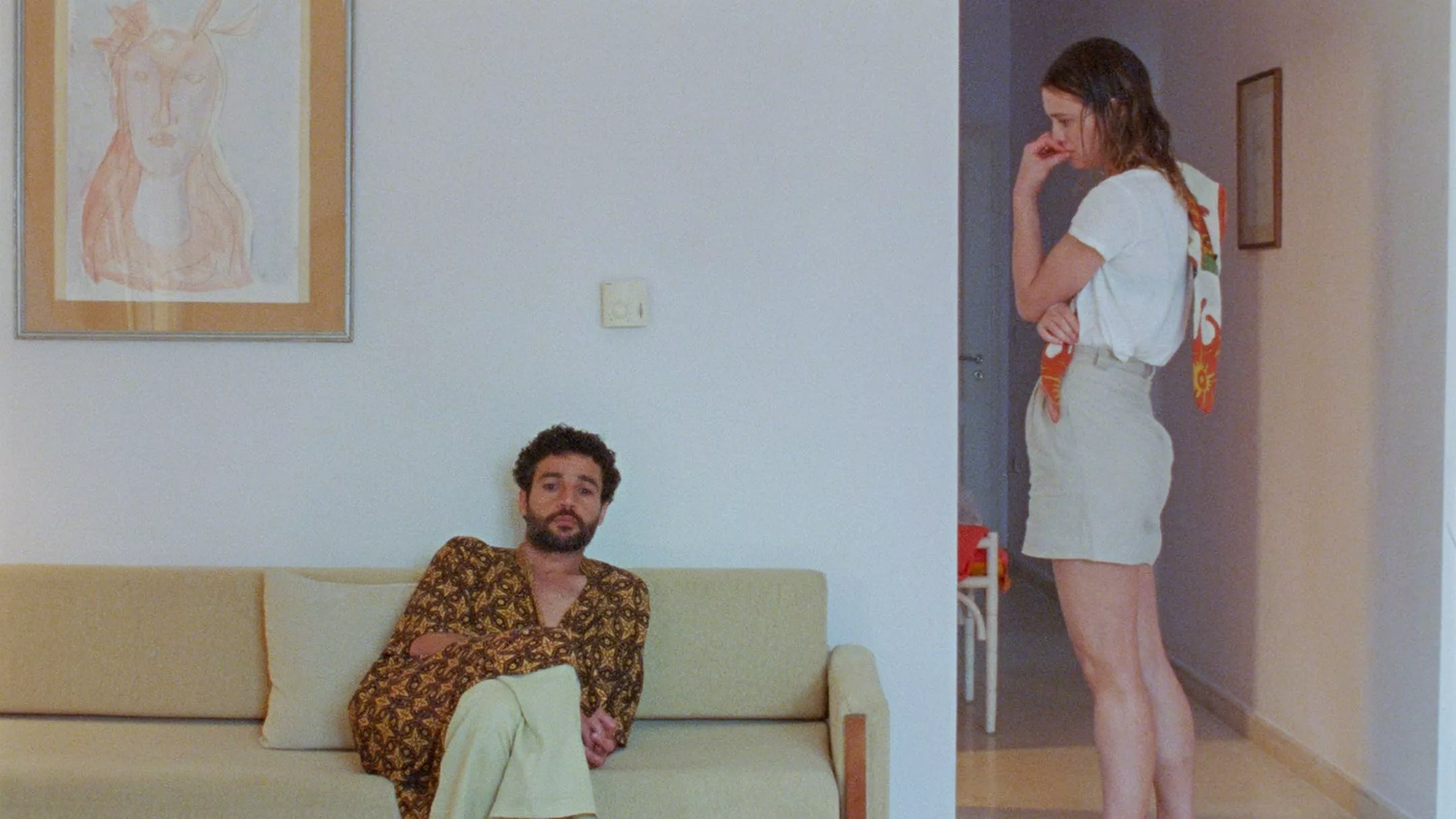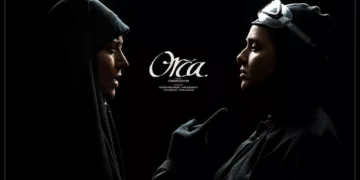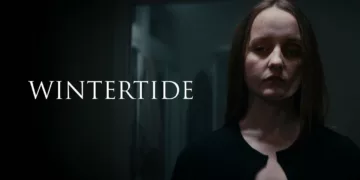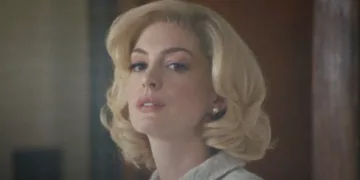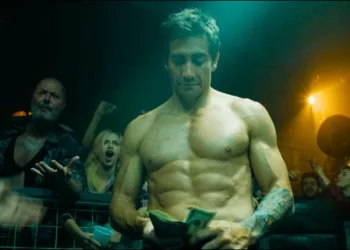Swimming Home splashes onto the screen as a psychological drama simmering with intrigue. When war correspondent Isabel and her depressed poet husband Joe arrive at their Greek holiday home, they’re shocked to find a mysterious young woman floating naked in their pool. This is Kitti, an enigmatic botanist whose presence throws the already strained marriage into further turmoil.
As Kitti insinuates herself into their lives, tensions build and long-buried secrets surface. Veteran commercials director Justin Anderson makes his feature debut, adapting the Man Booker-nominated novel by Deborah Levy into a film that blurs the lines between reality and imagination. With lush cinematography capturing the lazy heat of a Greek summer, Anderson slowly turns up the temperature as Kitti’s disruptive influence takes hold.
Anchored by Christopher Abbott and Mackenzie Davis as the troubled couple, the film promises a psychosexual game of cat-and-mouse. Ariane Labed adds intrigue as the volatile catalyst Kitti, bringing a physicality harking back to European arthouse icons like Maria Schneider. Blending family drama with erotic overtones, Swimming Home looks set to leave audiences luxuriating in its dreamlike atmospherics even as relationships curdle in the Mediterranean sun.
Family Fissures in the Greek Sun
Beneath the sunny exterior, cracks run deep in the central relationships of Swimming Home. The film explores the ruptures within a supposedly picture-perfect family as emotional truths float to the surface.
On vacation at a luxe Greek villa, famed war correspondent Isabel and her brooding poet husband Joe seem to embody a glamorous #couplegoals aesthetic. But their daughter Nina feels ignored, while distance and suspected infidelity have left the marriage adrift. The arrival of their houseguest Laura, an old friend of Isabel’s, highlights the couple’s disconnect through subtle barbs and telling glances.
When the seductive botanist Kitti turns up naked in their pool, latent tensions ripple into view. Kitti bonds with lonely Nina over plants and poetry, but to the parents she’s a disruptive force. Joe tries to keep his distance, wrestling with traumatic memories of childhood exile during the Bosnian War. But Kitti seems irresistibly drawn to his darkness, quoting his verses and probing at his psychic wounds.
For all her breezy free spirit persona, Kitti weaponizes her body to provoke reactions. She flaunts her nudity, spouts cryptic philosophy, and claims her flesh is poisonous from eating toxic plants. As this volatile stranger infiltrates the family, she drives all three toward their breaking points.
While the characters orbit around Kitti, she remains unknowable – a shapeshifting agent of chaos. When confronted about her past, she replies “My mother is the river, and I am always on the move.” An embodied question mark, Kitti cracks open the fault lines in relationships built on suppression and performance.
Beneath dreamy aesthetics, Swimming Home simmers with unease, its characters floating in dissociation and denial. As buried memories resurface, Anderson steeps his psychological study in ominous atmosphere. In this pressure cooker world, the family seems fated to either explode or transform.
Unsettling Imagery Reflects Inner Turmoil
Visually, director Justin Anderson mirrors his characters’ crumbling facades with formally inventive shot choices and eerie tableaux. After years directing commercials and short films, Anderson makes his unorthodox feature debut with Swimming Home’s dreamlike aesthetic.
Right from the opening shot of an inverted landscape with sky below and trees above, Anderson signals his intent to unsettle expectations. His off-kilter compositions frequently isolate characters, the visual disconnect emphasizing their alienation from one another. Striking interludes see Isabel visit an avant-garde dance club where contorted performers symbolize her fraying psyche.
The camera often lingers on Kitti as she crawls inverted like a crab, both defiant and debased. Anderson even depicts her urinating on Joe’s leg, reducing her to a bodily function while objectifying his numb detachment. These provocations highlight the characters’ lack of boundaries.
Meanwhile, the production design contrasts the home’s pristine interior with the wild, overgrown plant life outside. The golden afternoon light gradually cools into shadow, natural beauty harboring a quiet menace.
Anderson’s background in fine art shines through in tableaux of sunbathers posing like Greek statuary amid rocky outcrops. Are they real or imagined? Such surreal interjections underscore the characters’ loosening grasps on reality as Kitti’s presence unravels them.
With simmering eroticism coexisting uneasily with decay, Anderson’s images externalize invisible relational entropy. As emotions held in stasis come to a boil, so too does his visual language reflect splintering from within.
Captivating Performances Simmer with Subtext
Anchoring the film’s heightened moods is a compelling cast who excel at wordless communication. As central couple Joe and Isabel, Christopher Abbott and Mackenzie Davis balance emotional repression with subtle cracks that hint at frayed connections. Abbott makes the brooding Joe a black hole of melancholic energy, his sadness burrowed deep. Davis radiates a brittle poise as Isabel, her glamor unable to cover a profound exhaustion.
Together they occupy separate solitudes, estranged even when sharing the frame. Yet both actors convey that each still seeks some faint glimmer of reconciliation, even as they withdraw further into themselves. It’s a masterclass in conveying alienation through loaded silence and evasive body language.
By contrast, Ariane Labed fills the screen with freewheeling physicality as the mercurial Kitti. Often nude, Labed treats the camera as an empathetic confidante, her unguarded nudity underscoring her brazen lack of boundaries. With feline grace, Kitti insinuates herself into spaces and psyches, Labed mixing coiled power with waiflike vulnerability. Her monologues may spout cosmic nonsense, but Labed’s conviction sells Kitti’s magical thinking.
As daughter Nina, newcomer Freya Hannan-Mills provides an anchoring presence amidst the adult characters’ disintegration. Her loneliness and latent anger at both parents lends authenticity to the family fracture.
Together, the cast balance enigma and emotional clarity, even as their characters lose purchase on reality. They compellingly convey the story’s slide from surface tranquility into psychological vertigo.
Unpacking the Symbolism
Swimming Home revels in symbolic motifs and allusions to pry open its enigmatic narrative. Kitti herself functions as an embodied metaphor – neither fully real nor purely surreal, she operates in the liminal space between states of being. Her disruptive presence is the catalyst for breaking down barriers and excavating hidden truths.
The film’s dominant symbols render the inner psyche into vivid external forms. The cracked porcelain doll abandoned in the woods represents Nina’s lost innocence, emphasizing her premature induction into adult disillusionment. Images of Poisonous plants highlight the characters’ festering dysfunction, while shots framing Kitti inside a massive hole in the earth suggest a primal inner space where ego defenses vanish.
When Kitti crawls inverted under chairs, Anderson conjures The Exorcist in portraying her as a demonic, anarchic force here to violently shake things up. And an ongoing motif of naked sunbathers arranged in rigid tableaux seems to echo the Greek sirens luring ships to their doom – only here it is Kitti beckoning the family toward dissolution and revelation.
The film directly references Sophocles’ Oedipus Rex when naming the family’s horse after that infamous Greek tragic figure. It hints at similarly fraught intimacy issues destiny has in store – especially when it is revealed that Joe and Nina share the same birthdate.
Lush nature imagery juxtaposes the family’s creature comforts with wildness encroaching from outside. The elements reflect characters overrun by their own overgrowth – of trauma, of desire, of that which civilization represses.
Dancing just under the surface, this symbolic language points toward the universal. Swimming Home plunges into one family’s hidden depths to unearth secret longings and primal wounds that belong to us all. By peering behind the façade of normalcy, it floods the frame with humanity’s raw and naked truths.
Finding the Flow
Swimming Home undulates between languid afternoons and distressing dreamscapes, its tone shifting from sun-drenched languor to ominous intensity. Visual rhythms gently build emotional undertow, before Anderson plunges us into psychic darkness.
Early scenes bask in the drowsy warmth of a Greek holiday idyll, all golden hour light and blissed-out tranquility. But composed framing and poised performances suggest an artifice ripe for unraveling. When Kitti arrives naked in this seeming paradise, her brazen exposure foreshadows coming revelations.
As she ingratiates herself with the family, honeyed slow-motion suggests generations colliding, time dilating against Nina’s accelerated adolescence and her parents’ stagnant ennui. Kitti seems both ingenue and sage, an agent ushering them from paralysis into confrontation and catharsis.
Mid-film ruptures fracture the lulling atmosphere, with a suffocating dance sequence visualizing Isabel’s distressed state of mind. From here, scenes build with slow burns and sudden outbursts, pressurized realities exploding under stress. Fever dream digressions then plunge us into realms where inner shadows become flesh.
Still, there are moments of surprising warmth – as when Kitti and Nina bond by the pool at sunset, awash in amber half-light. Innocence glows through the gathering darkness.
But later, as Kitti recites Joe’s own words back at him like a vengeful Fury, a scroll of his poetry unfurling down the staircase, her incantatory power holds us rapt.
This ebb and flow, this push and pull between drift and confrontation – it conjures the characters’ approaching reckoning, as tidal truths surge toward revelation.
Swimming Into the Depths
In the end, Swimming Home dives past the Instagram perfection of its travel porn exterior to reveal the primal dreams and traumas dwelling in all of us. Some may find its enigmatic symbolism and stifling moods an acquired taste – but patient viewers will be rewarded with a psychologically immersive experience.
Those seeking grounded storytelling or empathetic characters may feel frustrated with Anderson’s oblique approach. Yet within its hermetic world, hushed revelations quietly disturb and disrupt. Still waters harbor unsounded depths.
For adventurous cinephiles who relish layered mysteries, Swimming Home promises dark riches beneath its glistening veneer. Anderson has fashioned an enchanted Eden out of unease, where evil lurks as the flipside of desire.
The film won’t be for everyone – its defiant weirdness courts alienation. But fans of psychological arthouse fare or surrealist cinema will discover a gem worthy of cult veneration. Illuminating hidden recesses of the psyche, Swimming Home earns 4.5 out of 5 stars for artfully rendering intimate disquiet into sublime unease. It lingers in the depths long after the final shot fades away.
So plunge in – these troubled waters seethe with discovery. Heartbreak, beauty and catharsis await in the blue below. Just don’t forget to come up for air from time to time…you’ll need oxygen for the journey ahead.
The Review
Swimming Home
Swimming Home makes waves as a psychological plunge into icy relational waters. Director Justin Anderson steeps familial dysfunction in surreal imagery, conjuring mystery from the depths of the unconscious. Anchored by captivating performances, the film floats on its dreamlike atmosphere even when narrative currents pull us under. For patient viewers, rewards lie in enduring its deliberate pace and symbolic obscurity. Still, uneven tones and alienating style choices won't click for all audiences.
PROS
- Strong visual style and cinematography
- Compelling lead performances
- Unique psychological themes and symbolism
- Thought-provoking exploration of relationships
- Captures atmosphere of tension and unease
CONS
- Slow pacing tests patience
- Plot can be vague and confusing
- Pretentious or opaque at times
- Uneven tonal shifts disrupt flow
- Alienating direction won't work for some











